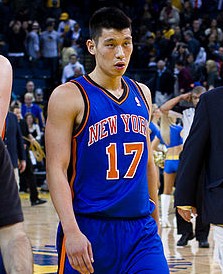Jeremy’s Got a Torn Lin-iscus.

The “Linsanity” may be over.
Basketball phenomenon Jeremy Lin will be out for the rest of the season as he undergoes surgery to repair a torn meniscus.
Lin, the first American-born player of Taiwanese or Chinese descent to play in the NBA, became a worldwide phenomenon in February, when the un-drafted Harvard player lead the New York Knicks to a number of crucial wins.
Lin injured his knee on March 24th in a game against the Detroit Pistons. The knee has remained sore, and an MRI showed that the 23 year old suffered from a torn meniscus.
Lin told ESPN:
I can’t really do much. Can’t really cut or jump, so it’s pretty clear that I won’t be able to help the team unless I get this fixed right now.It’s disappointing for me, it’s hard to watch the games and I think I’d want to be out there obviously more than anything right now. But hopefully, it’s a six-week rehab process but I tend to heal fast, so hopefully I can come back as soon as possible and still contribute this season hopefully.
Lin is expected to need at least six weeks to recuperate, effectively ending his season.
A meniscus is a C-shaped piece of cartilage located in the knee joint. There are two in each knee joint. The menisci act as a buffer between the bones, protecting the joint. They serves as a shock-absorption system, assisting in lubricating the knee joint, and limiting the ability to over flex or extend the leg at the joint.
Meniscal tears are most commonly caused by twisting or over-flexing the joint and frequently happen during sports. Players may squat and twist the knee, causing a tear. Direct contact, like a tackle, may be involved.
The most common symptoms of meniscal tear are:
- Pain
- Clicking or popping (especially at the time of the injury)
- Stiffness and swelling
- Catching or locking of the knee
- The sensation of the knee “giving way”
- Decreased range of motion at the knee
Treatment depends on the severity of the tear. Small tears may only need RICE treatment (rest, ice, compression, elevation) to allow the cartilage to heal on its own. Non-steroidal anti-inflammatory medications like aspirin or ibuprofen may be added for pain relief. More serious tears usually require surgical treatment- usually done arthroscopically, where the torn cartilage is trimmed or repaired.
























0 comments